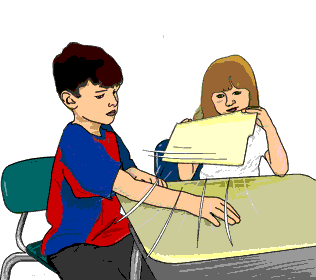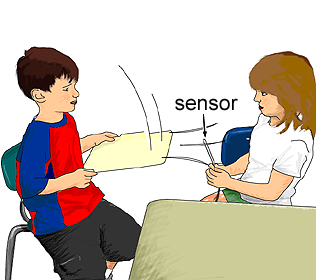 | ||
| || home ||| units ||||| help | ||
| All Units | > | Unit 3 - Sensing | > | Investigation 1 - Feeling and measuring temperature | > | Trial 2 |
Trial 2 - Compare Still Air and Moving Air
-
Make air move across your arm by waving a piece of paper or cardboard back and forth, like a fan. How does moving air feel on your arm compared to still air?

a. The moving air makes my arm feel cooler. b. The moving air makes my arm feel warmer. c. My arm feels about the same.
-
Now suppose you waved at the temperature sensor with the paper fan. What would the moving air do to the temperature? Make a prediction. Choose one.
a. The measured temperature would go down. b. The measured temperature would go up. c. The measured temperature would stay about the same. Why do you think this would be true?

-
Connect the temperature sensor to the computer. Refer to Technical Hints to connect the temperature sensor.
-
Measure the air temperature. You will need to wait a little while until the temperature stops changing. Refer to Technical Hints to record a single measurement.
STILL AIR TEMPERATURE =

-
Now wave your paper fan to make air move across the temperature sensor and measure the temperature again. You will need to wait a little while until the temperature stops changing. Refer to Technical Hints to record a single measurement.

MOVING AIR TEMPERATURE =

-
Compare the temperature of the still air with the temperature of the moving air. Was there a change? Why?
If there was a change of less than one degree, do you think it is significant?

-
Think about what the moving air does to your arm, compared to what it does to the temperature sensor. Do you think the moving air has more effect on your arm, or on the temperature sensor?
a. More effect on arm b. More effect on sensor c. Same effect on both Why?

-
Is there a difference between the feeling of temperature, and the measurement of temperature? If there is a difference, how would you explain it?

 |  |  |
Copyright 2005 The Concord Consortium, All rights reserved.